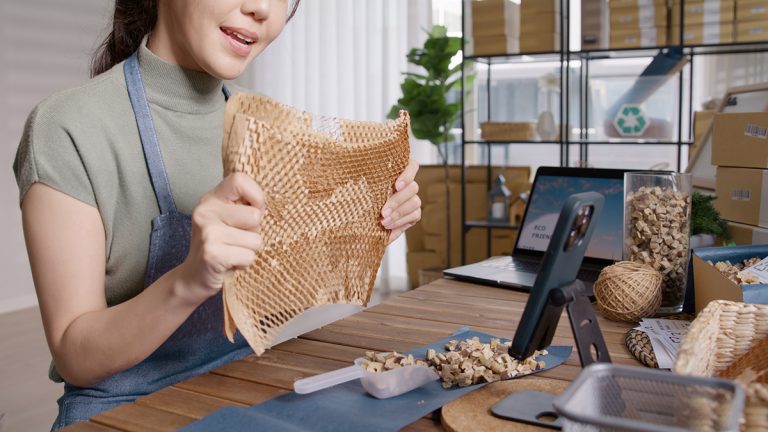Modern consumers increasingly value environmentally friendly products and services. Sustainable practices are essential if your eCommerce business wishes to attract people who desire a better Earth, especially younger ones. A Deloitte 2022 Survey found that Gen Z and millennials are willing to pay a premium for recyclable packaging, reusable utensils, organic food, and even second-hand clothing!
Quek Wei Ling, the Chief Business Officer of Synagie Group shares the statistics of Asian shoppers: More than 50% discontinued buying non-eco-friendly products while 63% considered whether something is sustainable or not before purchasing. The numbers don’t lie but if you’re still unsure about engaging in ecological business practices, here are 7 reasons why your eCommerce Business should go green:

Our panel of green-conscious advocates clockwise – Goh Fang Wei, Business Development Manager of Waste Management & Recycling Association of Singapore (WMRAS); Hazel Ye, Director of Sustainable Familie Trading; Quek Wei Ling, a trained pharmacist and Chief Business Officer of Synagie Group.

1. Sustainable Brands are Trendy
The support for sustainability around the world is growing by leaps and bounds. Sustainability awareness platform Zero Waste is one of the many that has found success, telling of what people are looking for. Its Instagram account has grown to an impressive 172K followers complete with a shop selling a bunch of eco-friendly stuff such as lunch boxes. The zero waste movement is also growing in Singapore, Malaysia, and Thailand, spreading education and advocacy for environmental conservation.
Hazel denotes that sustainability generates a demand of its own. People are taking action to protect our home, Mother Earth – thanks to abundant education and awareness spread in the last decade. Even stars like Leonardo DiCaprio have played their parts, with Leo setting up a foundation in securing a sustainable future and also sits on the board of the WWF.
Trending, highly marketable buzzwords include “recycle,” “upcycle,” and “eco-friendly.”
The proof lies in our search algorithms today. Simply run a Google search for “eco-friendly” and a slew of eCommerce products pop up: wooden spoons, jute bags, beeswax food wraps, and more. Since eCommerce platforms surface upon searching sustainable keywords, selling on Lazada can be a great way to gain visibility.
2. Gain a Competitive Advantage
eCommerce sellers today will do well to match the desire of target buyers. Shoppers today possess a heightened awareness of climate change with two-thirds of Gen Zs (68%) and millennials (66%) personally impacted by severe weather events triggered by climate change. Hazel specifies that eco-friendly businesses are gaining a competitive edge against those who stay ignorant towards green efforts
Thus, your brand has a chance of creating an inspiring unique selling point (USP) if you take a bold move towards using eco-friendly ingredients or packaging. Your brand becomes one that is memorable for going the extra mile. Additionally, your target buyers’ emotions of appreciation and a desire to participate in a good cause are evoked.
The data on trends support Hazel’s sharing that there is a clear expectation for ecologically sound business models. Forbes reports that 4 out of 5 millennials believe business should take environmental efforts while 9 out of 10 millennials will switch brands to one associated with a cause.

3. Long-Term ROI
Fang Wei shared that a business’ upfront cost to make some eco-friendly changes may cost a few thousand dollars. However, the return on investment (ROI) will be rewarding and can show up in just 12 months!
Another valid point is that eco-friendly measures are equivalent to less wastage disposal. This eventually cuts down disposal fees drastically. Wei Ling suggests that businesses can work with platform partners such as Lazada or any other eCommerce marketplaces in enabling their target buyers to shop and filter sustainable products.
Pro tip: If you are a startup or on a low budget, eCommerce platforms can be a great option as curating a website with a specific filter for sustainability can be complex to execute. Not to mention difficult to detect when people look up a sustainability keyword on Google.
4. Spread Awareness on Preserving the Environment
Heavy is the head that wears a crown. Hazel quipped that sustainability is very heavy, but it is a shared responsibility. Even the smallest action can impact social change. As a business, you have the influence to spread awareness on the need to minimize pollution, recycle, reduce waste, and choose better options for the environment. Let not your marketing and production budgets be in vain.
Instead, be sure to shine a spotlight on why you are taking certain green measures. Take for example leading New York skincare brand Fresh that now boasts 84% of its brick and mortar stores with full LED lighting and its goal for 100% recyclable packaging by 2025. LED lighting is amazing for the environment as it consumes less power with low carbon dioxide emissions as compared to other light bulbs.
5. Unite to Reduce your Nation’s Landfills
With great power comes great responsibility, as they say. Fang Wei called attention to the dire need for businesses in particular to unite in order to reduce wastage as a whole. Be it in production or packaging, businesses play a fundamental role in assisting our local government to achieve lower wastage for the good of our fellow citizens.
Brands selling daily consumer goods such as bath soaps, skincare, clothing, and preserved food use so much packaging and that is reason enough for businesses to care. Hazel gave an eye-opening scenario of children’s toys or pacifiers producing excess material due to the nature of these goods being cut out into certain shapes.
6. Care for the Consumer
Natural ingredients and clothing materials also serve to take care of consumers’ health. If you are in the fashion or bedding industry, you have the power to make a positive impact. Your action has the potential to create a chain reaction that spurs fashion houses to produce better quality clothing.
Clothing should prioritize both health and comfort. Avoid using polyester and nylon (polyamide) as these are highly synthetic, non-breathable, and can cause skin irritation. In fact, polyester fabric is made out of the same material as single-use plastic bottles.
Do strive to use natural fibers that are great for both the environment and human skin. The classic option is 100% cotton, an age-old natural fiber made from the outer coating of a cotton plant’s seeds. Lately, bamboo lyocell has emerged as a popular fabric to make shirts and bedsheets. It is completely biodegradable, sensitive skin-friendly, absorbs sweat, and is even antibacterial! Bamboo is a sustainable champion as it absorbs 5x more carbon dioxide than usual hardwood trees.

7. Build a Safe Home for our Future Generations
Maintaining the ecosystem for our children and theirs is incredibly important. Clean air, liveable weather, and low pollution levels to avoid dirt or radiation-related illnesses are at stake. The world is experiencing extreme weather changes that have ravaged fates and fortunes. Be it long spells of drought, floods caused by bad waste management, rapidly melting ice, higher sea levels, or forest fires like never seen before.
In Southeast Asia (SEA), waste levels have risen to terrifying levels. Wei Ling shares that in 2018, Singapore produced 1.6 million tonnes of domestic waste, with only 4% of plastic recycled. If this was before lockdowns were initiated, imagine the damage done today.
This is where eCommerce businesses need to come together to drastically reduce plastic waste. Mini steps such as replacing plastic bubble wrap with biodegradable honeycomb bubble wrap (made of craft paper), switching up to biodegradable plastic packaging, and using craft paper tape to seal boxes can make a world of difference. Start small, dream big!
Intrigued? Head over to howwesell.asia’s Lazada Insider page for more expert insights on the latest eCommerce trends. Find out what consumers want today.









